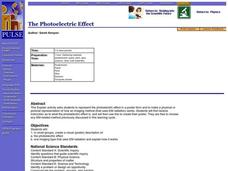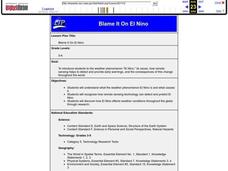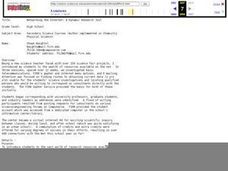Curated OER
Science: Birds in Flight
Young scholars identify and examine adaptations in birds that enable them to fly. They conduct Internet research to relate these adaptations to the physics of flight. Students observe birds in flight and describe their behavior and...
Curated OER
Extending Human Ability Through Technology
Learners explore how technology has been used to enhance human abilities. Using the internet, they watch a short video about prosthetics. They compare and contrast how prosthetics have changed over the years as technology has become...
Curated OER
Technology and the Human Eye
Fifth graders compare technology and the human eye. In this science lesson, 5th graders label the parts of the human eye and trace the path of light as it travels through the eye.
Curated OER
Physics Quiz
For this physics worksheet, students complete short answer questions about physics concepts such as electricity, space, light, and more. Students complete 20 short answer questions.
Curated OER
The Photoelectric Effect
After some online instruction, chemistry aces use their creative abilities to produce a poster describing the photoelectric effect and one type of imaging technology that uses electromagnetic radiation. This simple, straightforward...
Curated OER
Making Cents of Density
Middle schoolers utilize their knowledge of the physical properties of matter such as mass, volume, and density to solve a problem. They utilize the scientific method to solve a problem. Pupils analyze their data to determine whether...
Curated OER
The Physics of Hummingbirds: Magic in the Air
Students study hummingbirds and how they use Newton's law. In this motion lesson students complete several activities and view videos of hummingbirds.
Curated OER
Using Java Applets for Inquiry-Based Physics Lessons
Using Java Applets in the physics classroom can be a great way to reinforce scientific concepts.
Curated OER
The Is No Such Thing as a Perfect Pumpkin
Students explore using descriptive words to describe physical appearance. In this appearance lesson, students look at pumpkins and discuss how there is not a perfect pumpkin. Students also hypothesize about what the perfect pumpkin's...
Curated OER
Technology (Post Lab): Utility Companies
Students study physics. For this utility company research lesson, students discover how their local utility company charges for electricity. They listen to a presentation and then conduct internet research to find more information on...
Teach Engineering
Package Those Foods!
Designing the right package — it's more than a pretty picture. Challenge small groups to design a food package. They must consider the type of food they are packaging and the package's ability to control the physical and chemical changes...
Cornell University
Magnetic Mad Libs
Examine the science behind computer communication. After defining the properties of magnets, learners simulate how a computer hard drive works by sending each other binary codes using the magnets. They use these communications to...
Teach Engineering
The Grand Challenge
Magnetic resonance imaging, just how safe is it? The introduction to unit study of magnetic resonance imaging technology presents the grand challenge questions of how an MRI machine works, the risks involved, the physics involved, and...
Curated OER
Blame It On El Nino
Students study the weather phenomenon El Nino is and what causes it, and recognize how remote sensing technology can detect and predict El Nino. Students discover how El Nino affects weather conditions throughout the globe through research.
Curated OER
Slime and Intermolecular Attractions
Students explore the strength of intermolecular attractions. They make slime and compare the difference in the physical properties of sheet and powdered polyvinyl alcohol with polyvinyl acetate.
Curated OER
# 15 A Search for Automated Plastics Recycling Separation
High schoolers are challenged to investigate the physical and chemical properties of plastics and use them to design a system that could be used to separate them. 1st year chemistry students use density for separation, high schoolers...
Curated OER
DNA on Stick
Students experience a "hands-on" activity to get visual evidence of the physical nature of DNA and the process of DNA purification. They explore one method of chromosomal DNA isolation and DNA extraction.
Curated OER
# 05 Color Me Analytical
High schoolers are introduced to colorimeter on two levels. They investigate how to physically manipulate the colorimeters. Secondly, the students start on a pathway of discovery to one of the most important principles in analytical...
National Museum of Nuclear Science & History
Alphas, Betas and Gammas Oh, My!
Referring to the periodic table of elements, nuclear physics learners determine the resulting elements of alpha and beta decay. Answers are given in atomic notation, showing the atomic symbol, mass, atomic number, and emission particles....
Curated OER
Networking the Internet: A Dynamic Research Tool
Learners engage in a lesson that is concerned with the research of finding information to help them develop new science projects. They conduct research using a variety of resources that includes e-mail and discussion groups.
NASA
Just How Far is That Star?
Pupils often wonder how we know the distance to various stars. Starting with a thought experiment and progressing to a physical experiment, they determine the brightness and distance to various stars. The evaluation requires critical...
Curated OER
The Birds of a Feather Flock Together
Fifth graders identify all parts of an egg, and explore their importance to the life cycle of a chicken. Learners compare all sorts of birds and place them in categories based on what they look like. This five-day lesson effectively...
Coach My Video
CoachMyVideo Mobile: Easy Frame-Capture
Your class will be eager to improve their physical skills and bring their games to the next level after working with you and this app! Record your young athletes as they demonstrate their unique athletic abilities, and then review...
Star Date
Shadow Play
Three activities make up a solar system lesson that features the sun, its light, and the shadows it produces. Scholars step outside to discover the changes shadows make at different times of day, take part in a demonstration of how Earth...

























